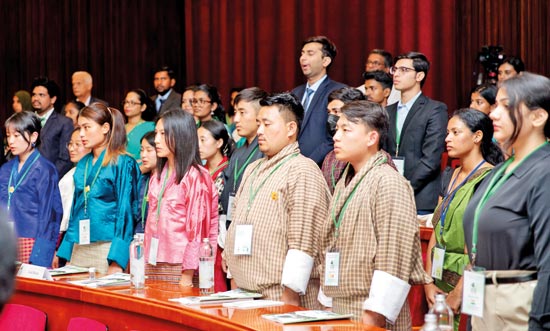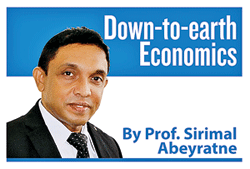Greening in an uncertain world
View(s):
At the SAESM sessions.
It was a busy week for the students of the Department of Economics, University of Colombo. They were preparing for months to welcome their counterparts from some other universities in South Asian countries – Bangladesh, Bhutan, India, Nepal and Pakistan.
They all, including the Sri Lankan Economics students – about 250 in number, participated in the 19th South Asian Economics Students’ Meet (SAESM 2024) in Colombo. The event was hosted by the University of Colombo in partnership with the World Bank, the UNDP, and the other institutions in individual countries.
SAESM is the annual get-together of the Economics students in South Asia to hold a conference and various types of academic competitions under a specific theme pertaining to economic affairs of the South Asian region. With its humble beginning in 2004 as a result of a novel idea among a couple of university academics, SASESM has showcased its growth and expansion, establishment and recognition, as well as its impact in the minds of emerging economists in South Asia. This is the fifth time that the Department of Economics of the University of Colombo hosted the event during the past 20 years.
Growing and expanding
South Asia is the world’s least-integrated region. Its integration and cooperation continued to remain weak and fragile, in spite of potential contribution by integration and cooperation to a better life of people living there. All the countries in South Asia are closer to the rest of the world, particularly the US and the EU, than to their own neighbours.
They are growing or attempting to grow more in isolation than together as a region. Apart from their own rivalries with the neighbours and the tightly controlled borders, the region is also a victim of the growing geopolitical tensions.
The ultimate victims of the lack of integration and cooperation are the people whose better living standards are deprived for generations. SAESM is not only an innovative concept, but also a forum that gives an opportunity for the budding economists from the universities to engage in economics research focusing on South Asian issues, to learn from each other coming from their neighbouring countries, and to build their network of bondages over the cracks and wounds that these countries carry forward.
They are the future leaders, policy makers, academics, business owners and corporate managers who would undertake their duties and responsibilities with a regional perspective. In this respect, SAESM has been recognised internationally as a forum that continues to lay foundations to contribute to regional integration and cooperation. It is among the very few regional collaborations in South Asia which has been continuing to grow and expand impacting upon regional integration and cooperation in South Asia.
Changing economics
This year’s SAESM theme, “Building Resilient Economies: South Asia’s Green Transition to a Sustainable Tomorrow” opened an opportunity for the economics undergrads to engage in research and competitions in various dimensions of green growth. They included sustainable technologies, circular economies, green energy, green financing, green travel and tourism, biodiversity and climate change.
 The world of economics is passing through another era of a dramatic change in economic discourse, development thinking, and policy making. In fact, the subject area of economics has changed and evolved through the issues that the world encountered as well as through related research and development activities. If we keep away from the changing and evolving world of economics, it would be too late for us to realise that we are outdated in economic thinking and policy making.
The world of economics is passing through another era of a dramatic change in economic discourse, development thinking, and policy making. In fact, the subject area of economics has changed and evolved through the issues that the world encountered as well as through related research and development activities. If we keep away from the changing and evolving world of economics, it would be too late for us to realise that we are outdated in economic thinking and policy making.
As far as development thinking and policy making is concerned, about 50 years ago there was a dramatic change in economics. It was a change from the popular inward-looking and controlled policy regimes towards outward-looking and liberalised policy regimes. If continued to remain passionate about the older policy regimes – of course, some would continue to do so, then Sri Lanka and other South Asian countries would not have undertaken their policy reforms too.
Productive factors
The contemporary change within economics is related to green growth, of which the fundamentals are rooted even in the basic economic problems. Environment is all about a set of natural resources and flows of services on the earth, above the earth and underneath the earth. Traditionally, the importance of this “stock of natural resources” has been undermined and undervalued.
We have treated the stock of capital, the stock of labour, and the stock of technological know-how fairly well; they are paid with reasonable factor payments, while we continued to invest in building them. But it has not been so with respect to the stock of natural resources.
Let me brief on the significance of the stock of natural resources. First and foremost, any form of output originates at the end of its upstream production process from two types of material inputs – either “grown-up” or “dug-up” things in the world. Accordingly, this resource as a vital input is getting depreciated over time, but its recovery is limited.
Secondly, in the process of converting such inputs into outputs, the world has been creating negative externalities on the environment in terms of pollution, climate change and biodiversity loss. These negative externalities have now threatened even the survival of the people and the planet.
Investing in nature
In business, spending to recover or to trade off the depreciation of the stock of natural resources was considered to be an additional cost. This attitude has been changing now as fair treatment to natural resources and a reasonable factor payment is an integral part of the core business. It improves the market competitiveness and international recognition of businesses rather than incurring additional costs.
In policy making too, environment policy was left as an agenda of the government, separated from the mainstream policy-making related to finance, planning, and development. This separation in policy-making is now changing too, because a better management of the stock of natural resources is an integral part of the economic policy itself.
Accordingly, spending in nature is no more considered to be a “spending” but rather an “investment” which generates returns to investment even in financial terms. However, the change in economic thinking and policy- making now takes into account the ways and means of rewarding economic performance that goes beyond mere financial returns.
Costly business
Although the organisational activities to hold the SAESM 2024 in Colombo were initiated about in mid-2023, doing business in an “uncertain political and regulatory environment” was the biggest challenge that the organisers faced.
The first blow to the event came with the Sri Lankan government’s decision to impose minimum hotel rates in October 2023. Ideally, we would have changed the venue from Colombo to another South Asian city. However, after making some preparations such a decision to change the venue was difficult. But it would have been the choice for many other such events.
The second blow to the SAESM 2024 came with the increase in the VAT rate to 18 per cent at the beginning of the year. It elevated the already negotiated prices of accommodation, lodging, transport and many others. As there were only a few weeks to the event, it was too late and too costly to cancel the event. Nevertheless, there would have been cancellations and downsizing of many businesses.
Although a subsidised air travel under MICE promotional activities had been offered directly by SriLankan Airlines, direct purchase of tickets for delegates from South Asia had to be replaced with a government procurement procedure. Accordingly, the organisers lost the subsidised air tickets offer, which raised the air travel costs too high for the same flights; someone commented, the procedure is more important than the outcome.
Stability
Finally, there were flight delays and cancellations. Whatever the reasons for the delays and cancellations, it has been a common issue that businesses in South Asia have to suffer from the region’s poor connectivity. Someone commented saying that “South Asia is not yet a region”.
Why I wanted to emphasise some of the above challenges that affected planning, executing and holding the SAESM 2024, just to highlight the fact that “doing business is costly in an uncertain environment”. It is important for any business to improve the “stability” in the business environment and to sustain it over a longer-term.
The writer is a former Professor of Economics at the University of Colombo and can be reached at sirimal@econ.cmb.ac.lk and follow on Twitter @SirimalAshoka).
Hitad.lk has you covered with quality used or brand new cars for sale that are budget friendly yet reliable! Now is the time to sell your old ride for something more attractive to today's modern automotive market demands. Browse through our selection of affordable options now on Hitad.lk before deciding on what will work best for you!


